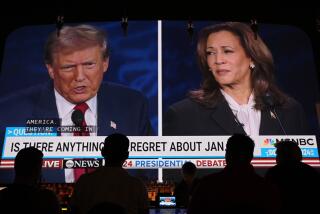Kerry Won. However ...
- Share via
Sen. John F. Kerry won Thursday night’s debate on foreign policy by a comfortable margin, but Americans may yet decide that President Bush is better able to clean up the mess he created in Iraq.
Kerry’s performance must have come as a huge relief to supporters who worry about the senator’s propensity to talk in nuanced, ponderous Capitolese. In contrast to the president, who at times seemed tired and annoyed at having to share the stage, Kerry’s command of the facts didn’t get in the way of his being lucid and direct. The senator and former prosecutor delivered a powerful indictment of Bush’s foreign policy record.
Kerry rightly accused the Bush administration of being more concerned with tax cuts than investing in homeland security. He could have pressed the point by noting that the president initially opposed federalizing airport security, creating the Department of Homeland Security and establishing the 9/11 commission, all of which the White House now trumpets as accomplishments.
The two men agreed that preventing nuclear proliferation was the top priority. But Kerry argued that since Bush went to war against a nation that apparently had no weapons of mass destruction, North Korea and Iran had only accelerated their very real nuclear programs. Kerry was less than convincing, though, in saying that bilateral negotiations with Pyongyang might bear fruit.
On the core issue of whether Iraq is central or peripheral to the war on terror, Bush for once refrained from making outlandish claims linking Al Qaeda and Saddam Hussein. Instead, he vaguely blurred our enemies into “those folks with hatred in their hearts” and kept talking generally about the “they” who attacked us. This elicited a strong rebuttal from Kerry: “The president just said something extraordinarily revealing.... He just said, ‘The enemy attacked us.’ Saddam Hussein didn’t attack us. Osama bin Laden attacked us. Al Qaeda attacked us.”
This came late in the debate when the president -- who oddly punctuated his thoughts with the refrain “it’s hard work” -- was clearly on the defensive. Bush never did counter another damaging Kerry attack, regarding the president’s failure to get Bin Laden: “Unfortunately, [Bin Laden] escaped in the mountains of Tora Bora. We had him surrounded. But we didn’t use American forces, the best-trained in the world, to go kill him. The president relied on Afghan warlords, and he outsourced that job too. That’s wrong.”
But that’s all in the past, and the inescapable quandary now facing the Kerry campaign is that it cannot offer a clear alternative for what needs to happen in Iraq going forward.
The senator acknowledges that the United States must now stay the course and try to bring stability and democracy to that country, so he is stuck arguing that he would do better at a mission he doesn’t think was essential in the first place. Bush was effective in mocking Kerry’s ability to bring in more allies to the “wrong war, wrong place, wrong time.” Indeed, Kerry’s claim that his plan is radically different falls flat when he goes through its particulars -- more summits, more training, more United Nations.
A recent Times poll tellingly revealed that even though a majority felt the Iraq war wasn’t worth it, more people trusted Bush over Kerry to develop a plan for succeeding there. Kerry doesn’t have a magic wand to undo Bush’s mistakes, and it must be frustrating to him that many voters feel as if they are stuck with the incumbent.
More to Read
Get the L.A. Times Politics newsletter
Deeply reported insights into legislation, politics and policy from Sacramento, Washington and beyond. In your inbox three times per week.
You may occasionally receive promotional content from the Los Angeles Times.










